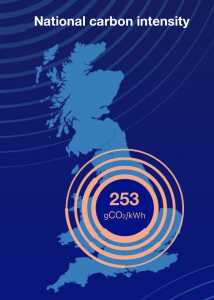@julianc, I think that electrification has to be the end goal, and I completely get your point about burning HVO (or any other biofuel) for home heating, but the supply of green energy remains an issue I can’t my head around. Yes, the UK has done an amazing job to get more renewable energy in play, but look at the attached charts from the grid for today.
Scotland - amazing. Wind and hydro delivering all their electricity. NE and NW of England - good. Rest of England and Wales is really, really poor, and this unfortunately is the norm since I’ve started to look at this data this year. It’s all gas and import. Today’s CO2 emissions for electricity production (which our heat pump would be using) far exceed what the HVO is emitting.
HVO is not a long-term solution, but it’s fulfilling a low carbon heating role for us this winter. And I think each household needs to figure out what it’s comfortable with and what works.
As you and Derek and others have stated, the objective is to use less energy… that’s our personal goal for 2022. We’re better than ever waiting for solar production to be high to do tasks that are electricity intensive, and the HVO has helped with that because all solar goes to home electric use, not the heat pump, when it’s cold outside. We’re better at not having lights on where we aren’t.
Get a copy of The Ultimate Guide to Heat Pumps
Subscribe and follow our YouTube channel!
Posted by: @majordennisbloodnokPosted by: @julianc...
I do not see how HVO helps this compared to full electric solution.
...
It's clear that HVO contains carbon and that burning it will release that back into the atmosphere. However, given its starting point is oil from a recent crop, and that even then it's only recycling that which has already been wasted, it's not unreasonable to regard it as carbon neutral; the crop fixes the carbon, the crop is used for culinary purposes, the waste is burned and releases the carbon back into the atmosphere.
The gold standard for resolving the global environmental problem we're facing is any form of energy production that doesn't release carbon; in effect, any carbon sink. However, we have very little time to fix the problem and we run the very real risk of doing nothing for fear of not picking the perfect solution. HVO, amongst other biofuels, represents a significant improvement in its carbon footprint compared with fossil fuels. If that buys us all time to put in place long term solutions it'll be serving its purpose.
The starting point is vegetable oil and hydrogen plus a lot of heat energy. So i think that it could only be considered carbon neutral if the hydrogen is produced from something like electrolysis of water using carbon neutral electricity, not if it’s steamed out of oil. Then to be picky, the processing would also need to be green, and the delivery tankers fuelled by HVO (which I believe they might be).
Not knocking it, it may well be a possible interim solution, I would just like to see clarity.
I'd just like to correct a misconception everyone here seems to have. The UK has in fact reduced it's power use massively over the last decade or so. Down from 357TWh in 2005 (60m people) to 287TWh in 2020 (67m people). We have over 10% more people and used 20% less power in total terms. Along side this the UK used large amounts of coal, which has also been phased out.
This is what surprises me when people say the grid can't handle more use. Of course it can, it literally did 10 years ago.
@editor I’ve downloaded the app to track carbon intensity. It is particularly poor at the moment. The low record is 39g CO2 / kWh. Oil is 245g CO2 / kWh. The 306g CO2 / kWh for current generation doesn’t take into account the COP of the ASHP whereas oil is just a 1 for 1 I think
Daikin Altherma 3H HT 12kWh ASHP with Mixergy h/w cylinder; 4kW solar PV with Solic 200 electric diverter; Honda e and Volvo EX30 Ultra Twin Performance electric vehicles with Myenergi Zappi mk1 & Ohme chargers
Posted by: @bataltoI'd just like to correct a misconception everyone here seems to have. The UK has in fact reduced it's power use massively over the last decade or so. Down from 357TWh in 2005 (60m people) to 287TWh in 2020 (67m people). We have over 10% more people and used 20% less power in total terms. Along side this the UK used large amounts of coal, which has also been phased out.
This is what surprises me when people say the grid can't handle more use. Of course it can, it literally did 10 years ago.
Hi Batalto,
I'm afraid it's not quite as simple as that. In the area where I live, 5GW of coal fired generating capacity has been shutdown over the past few years, so the grid in our area is probably under utilize now. So areas where renewable generation is being connected will probably need to be strengthened to cope with the extra capacity.
Electrical distribution systems are designed using a diversification factor, which assumes that not everyone will switch everything on at the same time and hence overloading the circuits. If everyone in an area were to charge an EV or battery storage, plus run a heat pump, all during a 4 hour period at night, I imagine it may cause problems if the local circuits are not strengthened.
I also suspect that much of the load reduction over the years, was due to the closure of heavy industry rather than domestic consumers using less.
Posted by: @julianc@editor I’ve downloaded the app to track carbon intensity. It is particularly poor at the moment. The low record is 39g CO2 / kWh. Oil is 245g CO2 / kWh. The 306g CO2 / kWh for current generation doesn’t take into account the COP of the ASHP whereas oil is just a 1 for 1 I think
Hi Julian,
To get everything in context, could you clarify on which date the low record of 39g CO2/kWh occurred?
Hi Julian,
To get everything in context, could you clarify on which date the low record of 39g CO2/kWh occurred?
January 3, 2022
Get a copy of The Ultimate Guide to Heat Pumps
Subscribe and follow our YouTube channel!
Posted by: @julianc@editor I’ve downloaded the app to track carbon intensity. It is particularly poor at the moment. The low record is 39g CO2 / kWh. Oil is 245g CO2 / kWh. The 306g CO2 / kWh for current generation doesn’t take into account the COP of the ASHP whereas oil is just a 1 for 1 I think
To address COP, the data I’ve used for our property is on compressor consumption - the actual amount of electricity we drew from the grid to run the heat pump - so our calculations were relatively straightforward by just multiplying by the amount of CO2 created to generate electricity on that day, so we’re comparing HVO directly to electricity.
Get a copy of The Ultimate Guide to Heat Pumps
Subscribe and follow our YouTube channel!
@derek-m, you’re welcome. The 39g is a terrific number, but the rest of January - 13 days - has been extremely poor with the electricity grid producing upwards of 200g/kWh.
Get a copy of The Ultimate Guide to Heat Pumps
Subscribe and follow our YouTube channel!
Today is another intensive day. 302g/kWh as a UK average. For the first time I truly understand the argument for nuclear energy. Interestingly, I think the Chinese had a successful fusion test earlier this year.
Get a copy of The Ultimate Guide to Heat Pumps
Subscribe and follow our YouTube channel!
- 27 Forums
- 2,505 Topics
- 58.1 K Posts
- 303 Online
- 6,237 Members
Join Us!
Worth Watching
Latest Posts
-
@jamespa Also a good way to get data- I have had a p...
By Travellingwave , 8 minutes ago
-

RE: New Solar, Batteries, Air Source and Under Floor Heating advice please
Good idea IMHO. You just need some appropriate time co...
By JamesPa , 15 minutes ago
-
RE: Testing new controls/monitoring for Midea Clone ASHP
Hi all. I have made some progress regarding cause of cy...
By Tasos , 17 minutes ago
-
RE: Rate the quality of your heat pump design and installation
My boiler had its service back in July last year (2025)...
By N1ckw , 34 minutes ago
-

RE: Need some help with choosing the right Rads
Wow, thats a big (or very poorly insulated) bathroom. ...
By JamesPa , 1 hour ago
-

RE: Setback savings - fact or fiction?
Monty Python may have asked 'what have the Romans ever ...
By cathodeRay , 3 hours ago
-

RE: Knock on effective of balancing radiators
Decorators caps, not screwed down (they can actually be...
By JamesPa , 3 hours ago
-

RE: Homely setup on daikin heat pump
@craigh Hello, I had best explain how my Homely control...
By Toodles , 4 hours ago
-

The road to upgrading to the latest CU standard is ofte...
By Batpred , 16 hours ago
-

RE: Electricity price predictions
I'm not so sure that the rest of society values a maths...
By JamesPa , 18 hours ago
-
RE: Say hello and introduce yourself
Thanks a lot GC61 - I'll open a separate thread in due ...
By Kev1964-IRL , 20 hours ago
-
RE: The Hidden Secret to a Successful Heat Pump: Pipe Size Matters
@falesh having a house of similar age the two issues I ...
By Terry1812 , 20 hours ago
-

RE: Our Experience installing a heat pump into a Grade 2 Listed stone house
Remember that the house continues to lose energy when t...
By JamesPa , 21 hours ago
-
RE: Renewables & Heat Pumps in the News
@editor I'd missed that, and it's a very good response ...
By Sheriff Fatman , 24 hours ago
-
There has been quite a bit of discussion (mostly on OEM...
By MartinRobinson , 1 day ago
-
RE: RDSAP10 effect on existing heat pump EPC rating?
@af1 My EPC rating jumped from E to C after installatio...
By dr_dongle , 1 day ago
-
RE: A Smarter Smart Controller from Homely?
@odd_lion the minimum MCS requirement is 2.8. I don't...
By benson , 1 day ago
-
RE: Advice on potential HW Cylinder size
I think the comment about heating from cold is quicker ...
By sjcsystems , 2 days ago
-

RE: Ideal HP290 14kW ASHP - how to optimise
Hi You can get a stethoscope for less than 10€ on Ama...
By bobflux , 2 days ago
-
RE: Struggling to get CoP above 3 with 6 kw Ecodan ASHP
Your DT is to low, you do not have enough heat exchange...
By ASHP-BOBBA , 2 days ago
-

RE: What determines the SOC of a battery?
I am aware. But is your chart direct from a Pace BMS ap...
By Batpred , 2 days ago
-
RE: Call for heat on open loop weather comp system
I don't know Grant system but most ASHP are very simila...
By ASHP-BOBBA , 2 days ago
-

@painter26 — good idea. Please do let us know what he s...
By cathodeRay , 2 days ago
-

RE: Solis inverters S6-EH1P: pros and cons and battery options
Yes, but I need to reopen the battery box.. I just noti...
By Batpred , 2 days ago






